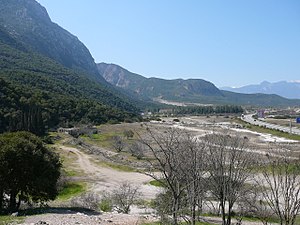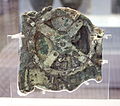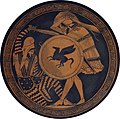Portal:Ancient Greece
The Ancient Greece Portal

Three centuries after the
Classical Greek culture, especially philosophy, had a powerful influence on ancient Rome, which carried a version of it throughout the Mediterranean and much of Europe. For this reason, Classical Greece is generally considered the cradle of Western civilization, the seminal culture from which the modern West derives many of its founding archetypes and ideas in politics, philosophy, science, and art. (Full article...)
Selected article -
The .
The Parthenon was built in thanksgiving for the Hellenic victory over Persian Empire invaders during the Greco-Persian Wars. Like most Greek temples, the Parthenon also served as the city treasury. (Full article...)Selected location -

Thermopylae is the site of
requires use of the pass. In ancient times it was called Malis, named after theDid you know...
- ... that after the battle of Plataea, the Greeks swore never to rebuild their sanctuaries, destroyed by the Persians during their invasion of Greece, but to leave them in ruins, as a perpetual reminder of barbarian ferocity?
- ...that Thebes, Greece played an important role in the fabric of Greek myth, being the site of the stories of Cadmus, Oedipus, Dionysus, and others?
- ...that the art of ancient Greece has exercised an enormous influence on the culture of many countries from ancient times until the present, particularly in the areas of sculpture and architecture?
Related portals
Selected biography -
List of selected biographies
|
|---|
General images -
-
Delian League ("Athenian Empire"), immediately before the Peloponnesian War in 431 BC. (from Ancient Greece)
-
Map showing events of the first phases of the Greco-Persian Wars. (from Ancient Greece)
-
Early Athenian coin, depicting the head of Athena on the obverse and her owl on the reverse – 5th century BC. (from Ancient Greece)
-
Alexander Mosaic, National Archaeological Museum, Naples. (from Ancient Greece)
-
An Ancient Greek pair of terracotta boots. Early geometric period cremation burial of a woman, 900 BC. Ancient Agora Museum in Athens. (from Greek Dark Ages)
-
The Antikythera mechanism was an analog computer from 150 to 100 BC designed to calculate the positions of astronomical objects. (from Ancient Greece)
-
Gravestone of a woman with her slave child-attendant, c. 100 BC (from Ancient Greece)
-
Map of the Late Bronze Age collapse (c. 1200 BC) in the Eastern Mediterranean (from Greek Dark Ages)
-
The lawgiver Solon reformed the Athenian constitution, which led to significant developments in Greece at the time (from Archaic Greece)
-
Dipylon Vase of the late Geometric period, or the beginning of the Archaic period, c. 750 BC. (from Ancient Greece)
-
A scene from the )
-
Marble bust of Pericles with apopulist political figure in the development of the radical Athenian democracy. (from Ancient Greece)
-
The Parthenon, a temple dedicated to Athena, located on the Acropolis in Athens, is one of the most representative symbols of the culture and sophistication of the ancient Greeks. (from Ancient Greece)
-
Greek hoplite and Persian warrior depicted fighting, on an ancient kylix, 5th century BC. (from Ancient Greece)
-
The Temple of Concordia, Valle dei Templi, Magna Graecia, in present-day Italy (from Archaic Greece)
-
The ancient Theatre of Epidaurus, 4th century BC (from Ancient Greece)
-
Geometric-style box in the shape of a barn. On display in the Ancient Agora Museum in Athens, housed in the Stoa of Attalus. From early geometric cremation burial of a wealthy pregnant woman, 850 BC. (from Greek Dark Ages)
-
TheVix Krater, an imported Greek wine-mixing bronze vessel found in the Hallstatt/La Tène grave of the "Lady of Vix", Burgundy, France, c. 500 BC (from Archaic Greece)
-
Homer, author of the earliest surviving Greek literature (from Archaic Greece)
-
The remains of the Temple of Apollo at Corinth, the first Greek temple to be built in stone. (from Archaic Greece)
-
The carved busts of four ancient Greek philosophers, on display in the British Museum. From left to right: Socrates, Antisthenes, Chrysippus, and Epicurus. (from Ancient Greece)
-
Finds from an early geometric Cremation Burial of a pregnant wealthy woman, from the N.W. of the Areopagus, about 850 BC,Ancient Agora Museum (Athens); exhibit 14–16: broad gold finger rings; exhibit 17–19: gold finger rings; 20: pair of gold earrings with trapezoid endings (from Greek Dark Ages)
-
Ancient Greek colonies in the archaic period (from Archaic Greece)
-
The gymnasium and palaestra at Olympia, the site of the ancient Olympic games. The archaic period conventionally dates from the first Olympiad. (from Archaic Greece)
-
Map showing the major regions of mainland ancient Greece and adjacent "barbarian" lands. (from Ancient Greece)
-
The majorAttalid dynasty occupied some of this area. Not shown: Indo-Greek Kingdom. (from Ancient Greece)
-
Ruins of the Temple of Apollo within the polis of Ancient Corinth, built c. 540 BC, with the Acrocorinth (the city's acropolis) seen in the background (from Archaic Greece)
-
Inheritance law, part of the Law Code of Gortyn, Crete, fragment of the 11th column. Limestone, 5th century BC (from Ancient Greece)
-
The Victorious Youth (c. 310 BC) is a rare, water-preserved bronze sculpture from ancient Greece. (from Ancient Greece)
-
The Temple of Concordia, Valle dei Templi, Magna Graecia, in present-day Italy (from Ancient Greece)
Selected picture

A caryatid (Greek: Καρυάτις, plural: Καρυάτιδες) is a sculpted female figure serving as an architectural support taking the place of a column or a pillar supporting an entablature on her head. The Greek term karyatides literally means "maidens of Karyae", an ancient town of Peloponnese.
Topics
Life:
Authors: Homer · Hesiod · Pindar · Sappho · Aeschylus · Sophocles · Euripides · Aristophanes · Menander · Herodotus · Thucydides · Xenophon · Plutarch · Lucian · Polybius · Aesop
Subcategories
Things to do
 |
Here are some tasks awaiting attention:
|
Associated Wikimedia
The following Wikimedia Foundation sister projects provide more on this subject:
-
Commons
Free media repository -
Wikibooks
Free textbooks and manuals -
Wikidata
Free knowledge base -
Wikinews
Free-content news -
Wikiquote
Collection of quotations -
Wikisource
Free-content library -
Wikiversity
Free learning tools -
Wiktionary
Dictionary and thesaurus























































